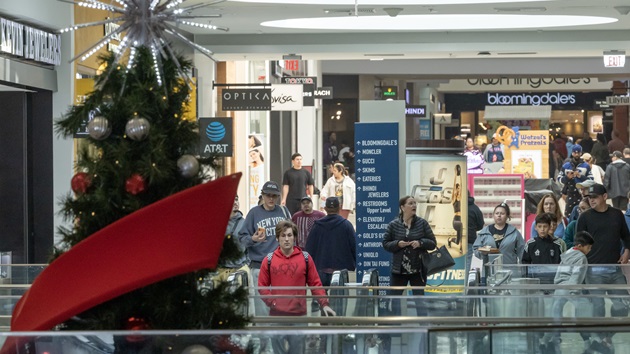Fed Chair Jerome Powell pumps brakes on rate cuts
Written by ABC Audio ALL RIGHTS RESERVED on April 3, 2024

(WASHINGTON) — The Federal Reserve will see if inflation moves beyond its current rough patch before imposing highly anticipated interest rate cuts, Fed Chair Jerome Powell said on Wednesday.
Addressing a business conference at Stanford University, Powell touted progress in the fight to cool price increases while acknowledging that such headway had stalled in recent months.
“On inflation, it’s too soon to say whether the recent readings represent more than just a bump,” Powell said.
“Given the strength of the economy and progress on inflation so far, we have time to let the incoming data guide our decisions on policy,” Powell added.
Inflation has fallen significantly from a peak of 9.1% but it remains more than a percentage point higher than the Fed’s target rate of 2%.
At a meeting last month, the Fed opted to keep rates highly elevated. The Fed Funds rate remains between 5.25% and 5.5%, matching its highest level since 2001.
The move marked the fifth meeting in a row at which the Fed has left rates unchanged, marking a prolonged pause of the aggressive rate hiking cycle that started in March 2022. The Fed said last month that it still intends to make three interest rate cuts this year.
The Fed’s next rate decision will take place at the beginning of May.
On Wednesday, Powell said the central bank faces risks whether it cuts interest rates too early or too late.
“Reducing rates too soon or too much could result in a reversal in the progress we’ve seen on inflation and ultimately require even tighter policy to get inflation back to 2%,” Powell said. “But easing policy too late or too little could unduly weaken economic activity and employment.”
He added, “As conditions evolve, monetary policy is well prepared to confront either of these risks.”
Interest rate cuts would lower borrowing costs for consumers and businesses, potentially triggering a burst of economic activity through greater household spending and company investment.
But the Fed risks a rebound of inflation if it cuts interest rates too quickly, since stronger consumer demand on top of solid economic activity could lead to an acceleration of price increases.
U.S. job gains far exceeded expectations in February, U.S. Bureau of Labor Statistics data earlier this month showed.
The U.S. added 275,000 jobs in February, surpassing predictions of about 200,000 jobs added, but marking a substantial decline from the hiring of roughly 350,000 workers in January, according to BLS data.
The S&P 500 reached a record high last month.
Attitudes about the economy have improved in recent months. Consumer sentiment inched lower in February but preserved much of the large gains achieved in previous months, a University of Michigan survey found.
Still, some areas of the economy have cooled.
The housing market has slowed substantially due in large part to soaring mortgage rates.
The average interest rate for a 30-year fixed mortgage has soared to 6.79%, rebounding after a steady decline at the end of last year, according to a report from Freddie Mac last Thursday.
Recent Stories from ABC News
Speaking on Wednesday, Powell referred to surveys of consumer and business sentiment that suggest inflation is widely expected to return to normal levels.
“The public does believe — and it’s a good thing, because it’s true — that inflation will go back down to 2%,” Powell said. “That’s very reassuring but that’s partly because of the very strong action we took and also because of our ongoing commitment to actually return inflation to 2% over time.”
“And that is our commitment,” Powell added.
Copyright © 2024, ABC Audio. All rights reserved.

 KVSP
KVSP 




